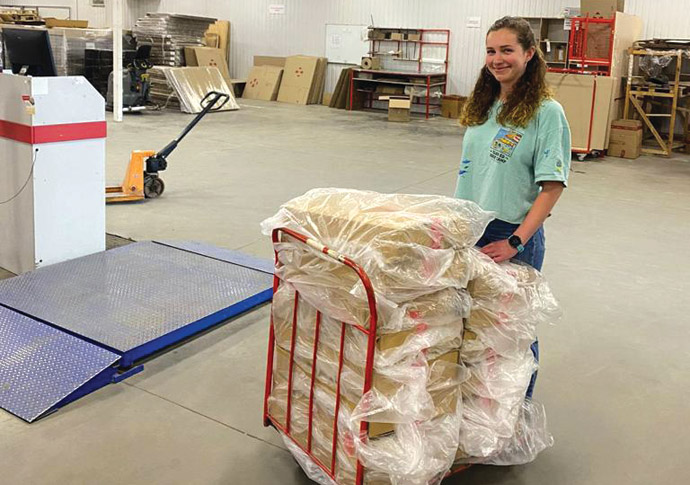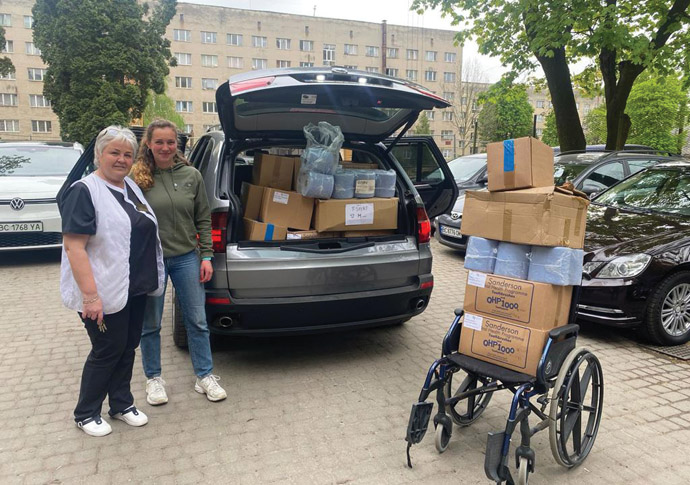Aid memoir
Dan Carrier talks to Kentish Town-based aid worker Madeline MacKenzie about her work in war-torn Ukraine
Thursday, 22nd June 2023 — By Dan Carrier

People in Lviv queue for ‘life boxes’
IT is hard to imagine the pain so many families experienced. In March, 2020, Russian soldiers swept through the south and east of Ukraine. They launched missile attacks on cities, bombarding the capital Kyiv as they tried to knock out the country’s government.
Civilians found themselves caught up in a deadly race to the Polish border. More than six million people were immediately displaced, and with the Ukrainian government insisting all men aged between 18 and 60 stay in the country, there was heartbreaking scene after heartbreaking scene as Ukrainian women and children headed west to safety – and their sons, brothers and partners turned back to face the war.
Madeline MacKenzie, 23, is from Kentish Town – and she has seen and heard first hand the tragedies so many have gone through, and how a group of Ukrainian men have dedicated the months since war smothering their country running vital humanitarian projects to save their fellow civilians trapped by the conflict.
Madeline is an aid worker for the NGO StaySafeUA based in the city Lviv.
With the help of the New Journal, she is hoping to raise funds to buy and kit out a mobile bakery for villages near the war-shattered city of Kershon – and Madeline will be returning for a brief visit to Kentish Town next week with some of her fellow aid workers to raise awareness, and rally support.
Speaking from Lviv, Madeline explained that the StaySafe project began in the early days of the war.
“A group of Ukrainians had come to the Polish border to evacuate their families,” she says.
“Men were not allowed to leave. They had to stay, and saw the humanitarian crisis first hand.
“They saw a lot of aid at the border that was not getting into the country. There was a big need at the border for the refugees, but an even greater need in the east.”
They rushed into action.
“Supplies were not getting through, and there were no big organisations – no Red Cross, no UN, no one was there on the ground – so this group of Ukrainian men set up an NGO and started driving aid in,” says Madeline.
The workers focus on the “last mile” areas of eastern Ukraine, taking in medical and humanitarian aid and also running an evacuation and refugee hub in Bakhmut, which has been the focus of intense fighting.
Aid known as “life boxes” – which provided a person with all they would need for a week – flow through StaySafe’s network and drivers return west with people they have rescued.

Madeline MacKenzie in Ukraine with the StaySafeUA aid
“The group helped develop a network of community leaders who had remained in their towns,” says Madeline.
And those in need are those who could not flee when war broke out. It means a high proportion were older people or those with disabilities.
“We collected medical supplies and got them to places where they had none,” she added.
Their latest project comes from a logistical issue Madeline has seen. StaySafe can source supplies of wheat and yeast to send eastwards – but across huge areas there is no electricity and no way to bake bread.
When she visits next week, plans will be laid to buy and kit out a mobile bakery van that will be driven to the Bakhmut area,where StaySafe have a distribution hub. The bakery will be staffed by three women who ran a bakery before the war in Bakhmut. They hope to bake 100 loaves a day for refugees.
StaySafe try to source as much as they can in Ukraine. The economy is working and there are products to be bought – and so it makes sense to support local businesses. The mobile bakery would not only provide food, but full-time employment for three women and in turn feed their families.
Madeline’s daily work ranges from speaking to English and Ukrainian donors, creating project proposals, finding funds anywhere she can. She wades through paperwork to get aid into the country – and can be found in the warehouse boxing up supplies, loading vans and sorting out what is coming in and what is going out.
Madeline’s journey from peaceful NW5 streets to a city at war began after she completed her A-levels and as a 17-year-old got a job in the aid sector.
She watched the refugee crisis in the Mediterranean unfold and decided to help.
“I had finished my final school year and I felt I could not sit there and not do anything,” she recalls.
“I did not do a lot of planning – I just showed up in Greece and started working in a café for refugees in Athens.
“We were feeding over 2,000 people every day.”

At the Lviv depot with a Ukrainian aid volunteer
Madeline was placed in charge and rose to the challenge. “It was intense and a very interesting way to get into the aid sector,” she said. “I managed volunteers, including in the refugee community. It was about learning to manage people from very different backgrounds from me. I learnt a lot.
“The experience could be quite tough. We found ourselves sometimes working against the authorities there. I enjoyed it and fell in love with this kind of work.”
Madeline headed to Loughborough University to study product design – but her heart was still with the aid sector.
“During Covid I was on a placement year, working at a design company – and then Covid hit,” she said.
She volunteered at a food project in Camden, and the experience persuaded her to pursue a career in the aid sector.
Her first job was a trip to Sierra Leone for three months – and then the Russian Army invaded Ukraine.
“I was contacted by a Ukrainian organisation who needed volunteers in a warehouse,” she recalls.
In August, 2022, she travelled across the border to Lviv to join the StaySafe team. “My experience in Sierra Leone set me up for this,” she says. “Sierra Leone is less in the news but it is an active combat zone. The dangers are different but are at a similar level. It is less talked about, and the day-to-day conflict there has been normalised.”
For Madeline, life in Lviv is that of working in a modern, European city – but under war conditions.
“It is now relatively quiet here. People try to live – as much as they can – a normal life,”she said. “It is a lovely, beautiful place. The restaurants and bars are open, though they close when the air raid sirens go off and there is a nightly curfew. It does feel like a normal city, like London, although there is a lot of military about.”
The war makes itself known in a myriad of ways. “You see people getting married every weekend as people are heading towards the front line,” she adds. “It is sobering.”
Despite the huge casualties, the environ-mental destruction, the constant threat of escalation as Ukraine’s counter offensive heaps further pressure on Vladimir Putin, Ukrainians are steadfast.
“Morale is good,” says Madeline. “In Lviv there is a strong sense of Ukraine winning this. Even when things are going less well, and it is less talked about, people have confidence Ukraine will win this.
“The biggest thing they say is they want their freedom, and they want the war to be done.”
• More information at www.staysafeua.org
• Stay Safe UA is hosting An Evening Sharing Stories from the Frontlines of Ukraine at 7pm on July 6 at Archway Tavern, 1 Navigator Square, N19 3TD. More details at: facebook.com/events/s/an-evening-sharing-stories-fro/791642575666165/